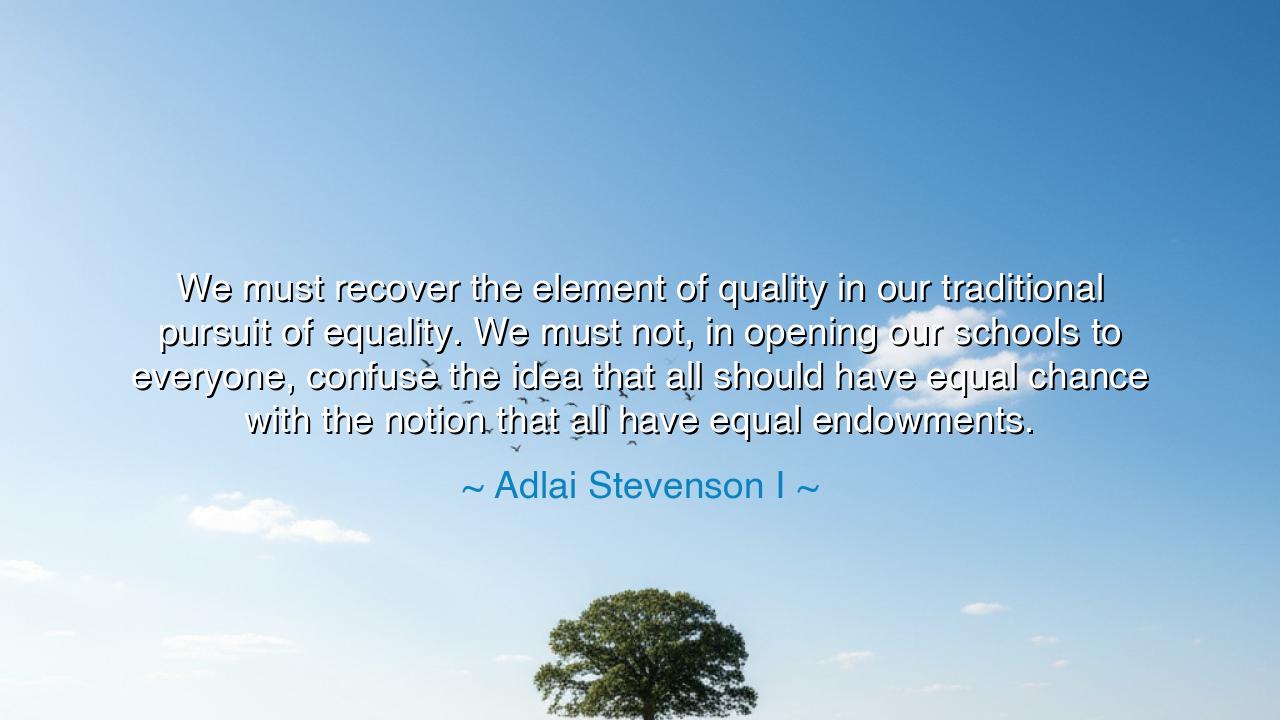
We must recover the element of quality in our traditional pursuit
We must recover the element of quality in our traditional pursuit of equality. We must not, in opening our schools to everyone, confuse the idea that all should have equal chance with the notion that all have equal endowments.






"We must recover the element of quality in our traditional pursuit of equality. We must not, in opening our schools to everyone, confuse the idea that all should have equal chance with the notion that all have equal endowments." These words by Adlai Stevenson I resonate deeply with a challenge faced by every society that seeks to balance equality and excellence. Stevenson speaks to the fundamental tension between giving everyone the chance to succeed and ensuring that this opportunity does not blind us to the realities of individual capacity. The idea of equality should never imply that every individual is endowed with the same talents or abilities, for true equality must be understood as providing opportunity, not guaranteeing identical outcomes.
In ancient thought, the balance between equality and quality was not a new debate. Plato, in his work The Republic, discussed the nature of justice and equality within society. He argued that people should be given roles based on their inherent abilities—that society should be organized not on the basis of equal outcomes, but on equal opportunity for people to fulfill their natural potential. Plato’s philosophy acknowledged that each person has different gifts and capacities, and while all should have access to education and the possibility of self-improvement, the end result would always vary. Plato understood that equality in opportunity does not translate to equality of result, for human beings are not all equally endowed.
In the same spirit, Aristotle too understood the tension between individual merit and the concept of a just society. In his Nicomachean Ethics, Aristotle wrote about virtue and the notion of individual excellence. He emphasized that human flourishing (or eudaimonia) arises not from an equal distribution of goods or outcomes, but from the pursuit of excellence within one’s own natural abilities. Aristotle’s framework for a just society was one in which individual differences were recognized and honored, and where the opportunity for excellence was available to all, but where the fruits of that excellence would not be the same for everyone. Stevenson’s words echo this ancient understanding: equality must be about access and opportunity, not about ensuring everyone reaches the same end.
The history of education offers a modern example of how the tension between equality and quality has played out. Consider the life of Horace Mann, a 19th-century educator who advocated for universal public education in the United States. Mann believed that education should be available to all, regardless of social class, and that this would provide the chance for each individual to rise according to their ability. However, Mann also recognized that education could not guarantee that every child would achieve the same level of success, for children entered school with differing backgrounds, skills, and aptitudes. Mann’s vision was for a system that offered equal access to education, but he did not expect that all students would reach the same end—rather, his goal was to provide them the tools to succeed, based on their individual talents.
In more recent history, we see this same tension played out in the debate over standardized testing and affirmative action in education. While these policies aim to create a level playing field, they often face criticism for either overshooting the mark or failing to address the individual differences of students. Equal opportunity is one thing, but how do we ensure that the quality of education and individual effort are properly recognized and rewarded? Stevenson’s quote challenges us to reconsider the value of quality—that equality of opportunity must always leave room for individual gifts to flourish, and that a rigid, one-size-fits-all approach does not do justice to the inherent diversity of human talent.
The lesson from Stevenson’s words is profound and instructive. True equality lies in providing opportunity for all, but quality must not be sacrificed in the name of equality. Society should not mistake the removal of barriers for the guarantee of the same end result. To ensure that all individuals have a chance to reach their fullest potential, we must recognize individual capacity and provide the necessary resources for everyone to succeed based on their own abilities. The quality of opportunity should not be confused with the equality of outcome; to do so would be to overlook the intricate and diverse nature of human potential.
In practical terms, we must reflect on how we approach education, work, and personal growth. The opportunity for success must be available to all, but we must also be mindful of the ways in which we evaluate and recognize achievement. Mentorship, personalized learning, and individual development must be prioritized so that each person can excel based on their unique abilities. It is not enough to provide equal resources; we must also offer the tools to allow each person to cultivate their inherent talents, ensuring that quality is maintained as we strive for equality in opportunity. Only then can we create a truly just society, one where everyone has the chance to become the best version of themselves.






AAdministratorAdministrator
Welcome, honored guests. Please leave a comment, we will respond soon